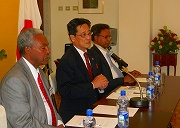|

|
|

|
| Ambassador's Speech>2011 >110514a | |||||
|
|||||
| at the 2nd General Assembly Meeting of the Japan-Ethiopia Alumni Society On 14 May, 2011 |
 |
||||
| 11 March is an unforgettable day for the Japanese people. On that day an earthquake and tsunami of unprecedented scale hit the Tohoku region off the Pacific Ocean. More than 27,000 precious lives were lost, and over 9,000 houses were destroyed. Several coastal cities were demolished. Even today, more than 110,000 people are having a difficult time, living in evacuation centers. The nuclear disaster in Fukushima has been causing concern for more than two months. Words cannot express our deep sorrow over the devastation. Immediately after the news of this natural calamity went around the world, letters of condolence started to arrive at the Embassy. H.E. President Girma sent a letter of condolences to Prime Minister Kan. His Excellency also visited this residence to sign the condolence book on behalf the Ethiopian Government and people while I was back in Tokyo. So many people in this country expressed their sympathy and warm encouragement for the Japanese people. Some even initiated fund-raising for those who have suffered from the disaster. I would like to take this opportunity to express my sincere appreciation for the solidarity you and your people have shown with the people in Japan at the most difficult of times. Two months have already passed since that awful earthquake and tsunami. In the tsunami-hit areas, untiring efforts continue to be made for rehabilitation, such as removing debris, fixing transportation networks as well as construction of temporary houses for evacuees. However, the areas damaged are so broad and the damage caused so enormous that our challenges are formidable. It will take some time before we can get back to normal. The nuclear disaster in Fukushima is another difficult issue, in a sense more serious and more complicated than the earthquake and tsunami themselves. The nuclear power plant, hit by such a strong tsunami, lost power supply, and the cooling system stopped functioning, which caused a series of problems. Day and night, every effort has been made to restore control over the nuclear power plant. According to the roadmap announced, it will take six to nine months. In the meantime every precautionary measure is being taken to ensure food safety. Radioactivity is being measured on a constant basis in the air, sea, soil, vegetables, milk, fish and water purification plants. If radioactivity beyond safe levels is detected, that item is withdrawn from distribution to markets. It is also withdrawn from export. Therefore, please feel reassured that contaminated produce and items are not in circulation and please ignore the sometimes sensational press reports. This is where we stand in Japan right now. May I now propose to have one minute’s silence, praying for the victims and those who still suffer from the earthquake and tsunami in Japan? |
|||||
|
|||||